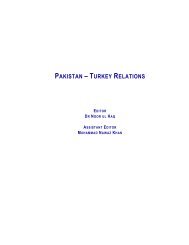120 Whither Kashmir? (Part II) - Islamabad Policy Research Institute
120 Whither Kashmir? (Part II) - Islamabad Policy Research Institute
120 Whither Kashmir? (Part II) - Islamabad Policy Research Institute
You also want an ePaper? Increase the reach of your titles
YUMPU automatically turns print PDFs into web optimized ePapers that Google loves.
2 IPRI Factfile<br />
share of assets to it, and Quaid-e-Azam Mohammad Ali Jinnah, while<br />
explaining his Two Nation Theory, proclaiming that he regarded Hindus<br />
as a great nation and their religion being equally great, and that his only<br />
contention was that the Muslims and Hindus were different and could<br />
not then be united under one political system. Jinnah was not communal<br />
or racist in his outlook, a fact that is now being increasingly realised in<br />
India.<br />
Politicians like L K Advani and Jaswant Singh and historians like H<br />
M Seervai and Dr Ajeet Jawed are discovering Jinnah as a non-communal<br />
and secular leader. If this is so, one may question why the partition<br />
entailed so much of bloodshed, riots and human misery? In fact, as the<br />
dust of emotions is settling down, it is increasingly becoming easier for<br />
the historians to have a better and more objective view of the past.<br />
Therefore, it is being realised that many of the problems which were<br />
believed to be the result of partition, such as the riots of partition,<br />
uprooting of twelve million people, the dispute over assets, the<br />
differences on the ownership of water resources, the issue of Rann of<br />
Katch, and problems in accession of the states, were, in fact, issues which<br />
should have been addressed as part of the partition package. It was the<br />
failure of the British colonial administration that it could not manage the<br />
process of partitioning the subcontinent amicably. Maulana Abul Kalam<br />
Azad holds that he had already briefed Mountbatten on the possibility of<br />
violent incidents but the latter claimed that being a soldier he would not<br />
hesitate in using the military and air force and would use tanks and<br />
airplanes to crush the riots if they erupted. His were just hollow<br />
statements.<br />
Though in the past six decades, some of the problems<br />
accompanying partition were partially or fully resolved by India and<br />
Pakistan bilaterally, the arbitration also proved helpful in some cases. For<br />
instance, the issue of river water was resolved through the World Bank<br />
assistance resulting in the Indus Basin Water Treaty, which was not ideal<br />
from the point of view of the either party. Yet it was accepted, as no<br />
other mutually agreed solution was possible. Likewise, the Rann of Katch<br />
issue was resolved in 1969 through the mediation of Britain. However,<br />
the <strong>Kashmir</strong> issue has remained unresolved. Pakistan and India fought<br />
two wars in 1947-48 and 1965 directly over <strong>Kashmir</strong>. Though the 1971<br />
war was fought due to the East Pakistan crisis, <strong>Kashmir</strong> was a crucial<br />
element in it and the subsequent Simla Agreement had implications for<br />
<strong>Kashmir</strong>. The 62 years saw the rise of nuclear ambitions in India and




